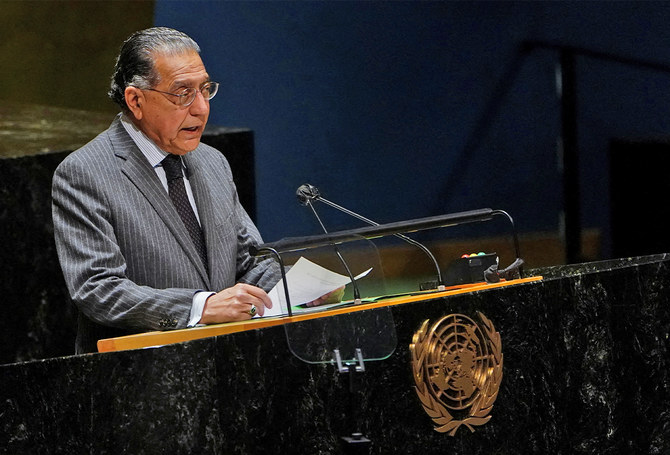ISLAMABAD: Ambassador Munir Akram, Pakistan’s permanent representative at the UN, said on Wednesday “all efforts” should be made to avoid further escalation of violence and loss of life as war rages in Ukraine, invaded by Russia.
The United Nations General Assembly on Wednesday overwhelmingly voted to reprimand Russia over the invasion and demanded that Moscow stop fighting and withdraw its military forces, an action that aims to diplomatically isolate Russia at the world body.
The resolution, supported by 141 of the assembly’s 193 members, ended a rare emergency session called by the UN Security Council and as Ukrainian forces battled on in the port of Kherson in the face of air strikes and a devastating bombardment that forced hundreds of thousands of people to flee.
The text of the resolution “deplores” Russia’s “aggression against Ukraine.” The last time Security Council convened an emergency session of the General Assembly was in 1982, according to the UN website.
Thirty-five members including China abstained and five countries including Russia, Syria and Belarus voted against the resolution. While General Assembly resolutions are non-binding, they carry political weight.
Pakistan has so far refrained from condemning Russian actions, and urged “dialogue and diplomacy” to resolve tensions.
“All efforts must be made to avoid further escalation of violence and loss of life as well as military, political and economic tensions which can pose an unprecedented threat to international peace and security and global economic stability,” Akram said at an emergency session of the UN General Assembly. “As consistently underlined by Prime Minister Imran Khan, the developing countries are hit the hardest economically by conflict anywhere.”
“We hope the talks initiated between representatives of the Russian Federation and Ukraine will succeed in bringing about a cessation of hostilities and normalization of the situation,” Akram said. “A diplomatic solution in accordance with relevant multilateral agreements, international law, and the provisions of the UN Charter is indispensable.”
The UN representative said Pakistan was most concerned about the safety and welfare of Pakistani citizens and students in Ukraine, adding that a majority of them had been evacuated.
“Those who remain will be evacuated soonest. We appreciate the cooperation of the Ukrainian authorities as well as the Polish, Romanian and Hungarian governments in this context,” Akram said.
More than 660,000 people, mostly women and children, have fled Ukraine to neighboring countries such as Poland and Romania since the invasion began, the UN refugee agency said.
President Vladimir Putin has drawn global condemnation since Russia invaded Ukraine last week and sanctions that have already sent the rouble into freefall and forced Russians to queue outside banks for their savings.
The West has imposed heavy sanctions on Russia to shut off its economy from the global financial system, pushing international companies to halt sales, cut ties, and dump tens of billions of dollars’ worth of investments. read more
But nearly a week since Russian troops poured over the border, they have not captured a single major Ukrainian city after running into far fiercer resistance than they expected.
At UNGA emergency session to condemn Russia, Pakistan urges 'all efforts' to avoid escalation
https://arab.news/gqy5d
At UNGA emergency session to condemn Russia, Pakistan urges 'all efforts' to avoid escalation

- President Vladimir Putin has drawn global condemnation since Russia invaded Ukraine last week
- Pakistan has refrained from condemning Russian actions and urged “dialogue and diplomacy"
Pakistan says PM Sharif has received invitation to join Gaza peace board

- Board is set to supervise temporary governance of Gaza
- Gaza has been under a shaky ceasefire since October
ISLAMABAD: Pakistan’s foreign ministry said on Sunday Prime Minister Shehbaz Sharif had received an invitation from US President Donald Trump to join the so-called “Board of Peace” for Gaza.
The White House on Friday announced some members of this board, which would outlive its role supervising the temporary governance of Gaza, under a fragile ceasefire since October.
The names include US Secretary of State Marco Rubio, President Donald Trump’s special envoy Steve Witkoff, former British prime minister Tony Blair and Trump’s son-in-law, Jared Kushner. Trump is the chair of the board, according to a plan the White House unveiled in October.
Israel and the Palestinian group Hamas signed off on Trump’s plan, which says a Palestinian technocratic administration will be overseen by an international board, which will supervise Gaza’s governance for a transitional period.
“The Prime Minister of Pakistan has received the invitation from the President of the United States to join the Board of Peace on Gaza,” the Foreign Office said in a statement.
“Pakistan will remain engaged with international efforts for peace and security in Gaza, leading to a lasting solution to the Palestine issue in accordance with United Nations resolutions.”
Many rights experts and advocates have said Trump overseeing a board to supervise a foreign territory’s governance resembles a colonial structure, while Blair’s involvement was criticized last year due to his role in the Iraq war and the history of British imperialism in the Middle East.
The White House did not detail the responsibilities of each member of the board. The names do not include any Palestinians. The White House said more members will be announced over the coming weeks.
It also named a separate, 11-member “Gaza Executive Board” to support the technocratic body, including Turkish Foreign Minister Hakan Fidan, UN Middle East peace coordinator Sigrid Kaag, United Arab Emirates International Cooperation Minister Reem Al-Hashimy, and Israeli-Cypriot billionaire Yakir Gabay.
But Israeli Prime Minister Benjamin Netanyahu’s office has said the composition of this board had not been coordinated with Israel and contradicted its policy — possibly a reference to Fidan’s presence, as Israel objects to Turkish involvement.
With inputs from Reuters










